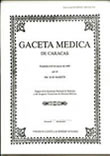Historia Médica Electrónica
Contenido principal del artículo
Resumen
La Historia Médica Electrónica es un concepto en evolución que se define como una recopilación sistemática de información digital de salud de los pacientes o las poblaciones, por medio de los informes elaborados por los institutos prestadores de salud. En la década de 1960, Lawrence L. Weed describe por primera vez el concepto de registros médicos electrónicos o computarizados y describe un sistema para automatizar y reorganizar los registros médicos de los pacientes para mejorar su utilización y así llevar a la mejor atención al paciente. Se la puede aplicar en: 1. Asistencia, 2. Docencia, 3. Investigación Clínica y Epidemiológica, 4. Gestión Clínica y planificación de recursos, 5. Control de calidad Asistencial y Legal. En Venezuela desde 1971, Tinedo, Ramón, Gómez Cova, David 1974, Irma Senior de Blankenburg 1980, Tulio López Ramírez 1985, Felipe Bello 1986 y muchos otros trataron el tema de la Historia Médica y la calidad del acto médico. Hicimos el estudio por la red de 20 países que consideramos los más importantes, con el fin de tener una visión global de la situación. En todos ellos se usa la HME pero la extensión de su uso no es uniforme. Señalamos los niveles de atención médica, y la clasificación y características de los Hospitales y Ambulatorios. Hacemos especial énfasis en el control de la calidad del acto médico. Participaron dos Profesores de la Escuela Razetti UCV, tres médicos que hicieron experiencias con la HME, un Especialista en Salud Pública y un Cirujano de Tórax.
Palabras clave: Historia Médica Electrónica. Calidad y control de la atención médica
SUMMARY The electronic medical record is an evolving concept that is defined as a systematic collection of digital health information of patients or populations, through reports prepared by health providers’ health institutes. In the 1960’s, Lawrence L. Weed describes for the first time the concept of electronic or computerized medical records and describes a system for automating and reorganize the medical records of patients to improve their use and thus take the patient to the best care. It can be applied: 1. Healthcare, 2. Teaching, 3. Clinical research and epidemiological, 4. Clinical management and planning of resources, 5. Quality healthcare and Legal Control. In Venezuela since 1971, Tinedo, Ramon, Gómez Cova, David 1974, Irma Senior Blankenburg 1980, Tulio Lopez Ramirez 1985, Felipe Bello 1986 Senior and many others addressed the issue of the medical history and the quality of the medical act. We did the study by the network of 20 countries we consider to be the most important, in order to have a global view of the situation. MEH is used in all, but the extension of its use is not uniform. We pointed out the levels of medical care, and classification and characteristics of hospitals and clinics. We make special emphasis on the control of the quality of the medical act. Involved two teachers from the school Razetti UCV, three doctors who made experience with the EHR, a public health specialist and a chest surgeon.
Key words: Electronic medical History. Quality and control of the health care.
